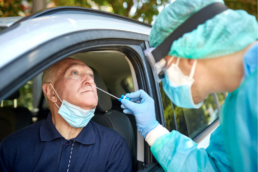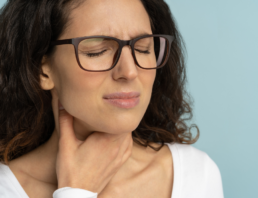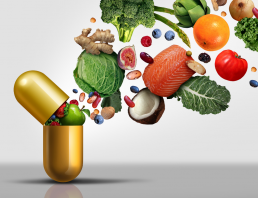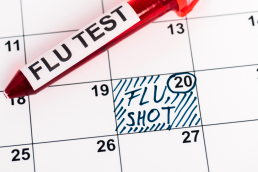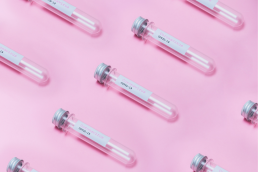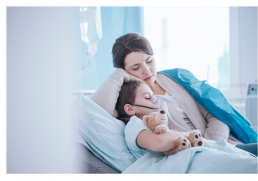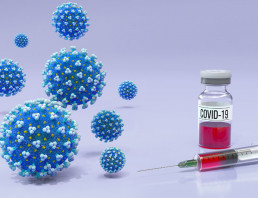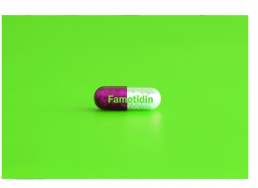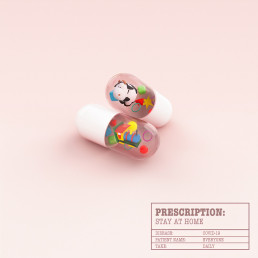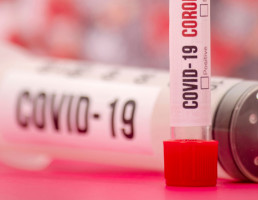Now Offering RT-PCR Testing with Results in 1 hour!
We NOW OFFER RT-PCR Testing with Results in 1 hour!
How does it work?
All testing is performed outside of the pharmacy, with parking in front of the pharmacy in any of the 15 minute parking spots. When you arrive at the pharmacy, please call our main line at 619-303-7771 and someone will be right out to assist.
Once you arrive our staff member will provide you with the testing kit. You will be instructed on the steps needed to complete the test. The test is an anterior nasal swab (it is inserted only at the tip of the nose). The test is completely self-contained – no mixing of fluids or complex testing procedure required. Once the swab is performed our staff will send your results via e-mail OR you may pick up your results once they are ready. Results may be ready in as little as 1 hour.
What is the age requirement for testing?
The minimum age for testing is 2 and above.
What is the Turn Around Time (When should I expect my results)?
The estimated turnaround time is 1 hour. Results will be sent via e-mail (or may choose to pick up) with same day results. If your results are NOT needed in 1 hour we offer additional turn around times. Please refer to "What is the cost of the PCR" for additional information on turn around times.
Is the Lab CLIA-certified?
Yes, our pharmacy has a CLIA waiver.
Is the test FDA approved?
The kit has an emergency authorization use by the FDA.
What is the cost of the PCR?
The cost varies on how soon you need your results.
Results within 48 hours is $175.
Results within 24 hours is $199.
Results within 1 hour is $329.
Do you accept health insurance?
At this time, we do not directly bill health insurance. We will be glad to provide you with a detailed receipt that you may wish to turn into your insurance to seek possible reimbursement.
Will it meet my travel requirements?
Due to ongoing changes and differences between airlines/countries/states requirement, we cannot assure that your results will be accepted for specific travel requirements. We recommend that you reach out to your airline/country for exact requirements and if the test RT-PCR test offered by Rancho Pharmacy will meet those requirements.
Does your test meet the requirements for Hawaii?
No our test will NOT be sufficient for travel to Hawaii.
I received a negative test what does this mean?
The Cue COVID-19 Test is a U.S. FDA Emergency Use Authorized molecular nucleic acid amplification test (NAAT) that detects the genetic material of SARS-CoV-2 using a molecular amplification reaction that is an equivalent amplification method to molecular polymerase chain reaction (PCR). A Negative result means that Cue COVID-19 Test did not detect SARS-CoV-2 virus in your sample.
How do I register?
You may register online on our website under COVID testing. Make sure to select PCR when choosing what type of the test. We also recommend you remind our staff member the type of test you wish to have performed.
What does it mean if the specimen tests negative for the virus that causes COVID-19?
A negative test result for this test means that SARS- CoV-2 RNA was not present in the specimen above the limit of detection. However, a negative result does not rule out COVID-19 and should not be used as the sole basis for treatment or patient management decisions. It is possible to test a person too early or too late during COVID-19 infection to make an accurate diagnosis via Cue COVID-19 Test.
In addition, asymptomatic people infected with COVID- 19 may not shed enough virus to reach the limit of detection of the test, giving a false negative result. In the absence of symptoms, it is difficult to determine if asymptomatic people have been tested too late or too early. Therefore, negative results in asymptomatic individuals may include individuals who were tested too early and may become positive later, individuals who were tested too late and may have serological evidence of infection, or individuals who were never infected.
When diagnostic testing is negative, the possibility of a false negative result should be considered in the context of a patient’s recent exposures and the presence of clinical signs and symptoms consistent with COVID-19. The possibility of a false negative result should especially be considered if the patient’s recent exposures or clinical presentation indicate that COVID- 19 is likely, and diagnostic tests for other causes of illness (e.g., other respiratory illness) are negative. If COVID-19 is still suspected based on exposure history together with other clinical findings, re-testing with an alternative method should be considered by healthcare providers in consultation with public health authorities. Additional testing may be helpful to ensure testing was not conducted too early.
Risks to a patient of a false negative test result include: delayed or lack of supportive treatment, lack of monitoring of infected individuals and their household or other close contacts for symptoms resulting in increased risk of spread of COVID-19 within the community, or other unintended adverse events.
The performance of this test was established based on the evaluation of a limited number of clinical specimens. The clinical performance has not been established in all circulating variants but is anticipated to be reflective of the prevalent variants in circulation at the time and location of the clinical evaluation. Performance at the time of testing may vary depending on the variants circulating, including newly emerging strains of SARS- CoV-2 and their prevalence, which change over time.
What does it mean if the specimen tests positive for the virus that causes COVID-19?
A positive test result for COVID-19 indicates that RNA from SARS-CoV-2 was detected, and therefore the patient is infected with the virus and presumed to be contagious.
Test results should always be considered in the context of clinical observations and epidemiological data in making a final diagnosis and patient management decisions. Patient management should be made by a healthcare provider and follow current CDC guidelines.
The Cue COVID-19 Test has been designed to minimize the likelihood of false positive test results. However, in the event of a false positive result, risks to patients could include the following: a recommendation for isolation of the patient, monitoring of household or other close contacts for symptoms, patient isolation that might limit contact with family or friends and may increase contact with other individuals with COVID-19, limits in the ability to work, the delayed diagnosis and treatment for the true infection causing the symptoms, unnecessary prescription of a treatment or therapy, or other unintended adverse effects.
#PCR#RT-PCR#NAAT#testign#covid-19
Now Offering Strep Testing, with results in 5 minutes!
Why is it important to test for Strep?
Rapid diagnosis and early antibiotic therapy for Group A Streptococcal infection are the best means of preventing medical complications and reducing the spread of the disease.
Group A Strep is a bacterial infection common in school-age children (with limited cases in infants and older adults) that is generally experienced in the United States during winter and spring.
Streptococcus pyogenes is a gram-positive coccus, which contains the Lancefield group A antigen that can cause serious infections such as pharyngitis, respiratory infection, impetigo, endocarditis, meningitis, puerperal sepsis, and arthritis. Left untreated these infections can lead to serious complications, including rheumatic fever and peritonsillar abscess. Traditional identification procedures for group A streptococcal infection involve the isolation and identification of viable organisms using techniques that require 24 to 48 hours or longer.
Rapid diagnosis and early antibiotic therapy of group A streptococcal infection appear to be the best means of preventing medical complications and reducing the spread of the disease.
What type of testing is offered by Rancho Pharmacy?
Group A Streptococcus rapid antigen testing is a digital immunoassay that quickly efficiently and reliably detects the presence of Group A Strep antigen from throat swabs of patients suspected of having Group A Strep. It is a qualitative test that detects the presence of Strep A antigen in throat swab specimens from symptomatic patients, providing results within 5 minutes.
The test is a simple throat swab sample collection with fast, reliable results in as few as 5 minutes.
The test utilizes antibodies specific for whole cell Lancefield group A Streptococcus to selectively detect Strep A antigen.
What is the sensitivity of the test?
Sensitivity measures the ability of the test to appropriately make a positive identification. The test has a high sensitivity rate of 95.4%, resulting in fewer false negatives.
What is the specificity rate?
Specificity measures the ability of the test to properly identify the absence of the test target. The test has a high specificity rate of 95.7%, resulting in fewer false positives.
What happens if I receive a positive test?
If you receive a positive test you should immediately contact your doctor. If you would like our pharmacy to contact your doctor please let the pharmacist know so that we may coordinate with your provider. Your doctor will decide on how to proceed further and may choose to prescribe an antibiotic. If your doctor prescribes an antibiotic our pharmacy is happy to assist with filling your prescription.
What is the cost of the test?
The test costs $30. At this time, we are unable to accept insurance however we are more than happy to provide you with receipt so you may attempt to seek reimbursement from your insurance.
Boosting the Immune System during the COVID-19 Pandemic
As COVID-19 continues to spread many people are looking for ways to boost their immune system. By keeping an immune system strong our bodies defense systems can be as strong as possible.
So, what does our immune system do?
The immune system is an intricate network of units that come together to fight off invaders, otherwise known as bacteria, virus and other foreign substances. Therefore, it is best to strengthen your immune system so that it may run efficiently to fight off diseases. This can be accomplished with dietary supplements, eating right, reducing stress and maintaining a healthy lifestyle.
It is important to note that the Center for Disease Control (CDC) emphasizes that supplements are not meant to treat or prevent COVID-19, however it may affect the immune system’s ability to fight infections and reduce inflammation.
So, what are some important supplements that may benefit in moderation?
- Vitamin D: Is an important immune strengthening nutrient that may potentially reduce the risks of colds and the flu.
- Zinc: May help reduce the number of infections and duration of the common cold when taken within 24 hours of onset. It is important to note that high intake of zinc may deplete copper levels. If you are worried about copper levels look for products that contain both copper and zinc.
- Vitamin C: There are several studies that suggest vitamin C may help prevent viral, bacterial and other infections shortening the duration of colds and reducing inflammation
- Selenium: Is a key nutrient for immune function. It is an antioxidant that strengthens the body’s defenses against bacteria and viruses.
- Garlic: may reduce the severity of upper viral respiratory infections and function in preventing viral infections of the common cold.
- Probiotics: contain good bacteria that both support gut health and influence the function and regulation of the immune system. They also may decrease the number of respiratory infections especially in children.
- Mushrooms: a variety of mushroom species have been shown to help with immune function including Shiitake, Lion’s Mane, Maitake and Reishi. At Rancho pharmacy we carry the Host Defense line for mushrooms.
- Honey: May help relive minor pain and inflammation of the mucous membranes. It also has antioxidant properties and some microbial effects. Note that honey is not recommended for children under 1 years old due to the risk of botulism
It is important to note that these supplements are suggestions and more research needs to be done. If you want to try theses, be sure to communicate with your health care provider and take them in moderation or as your doctor recommends.
So, what are other strategies that can be done to strengthen your immune system?
- Regular exercise. Many experts recommend at least 150 minutes of moderate exercise per week
- Eating a healthy, balanced diet that includes fruits and vegetables
- Maintaining a healthy weight
- Obtaining adequate quality sleep
- Reducing stress: Chronic stress is associated with elevate4d cortisol levels. This can cause immune dysregulation that varies in severity
For more information stop by Rancho Pharmacy to speak to one of our knowledgeable staff members.
References:
- https://www.covid19treatmentguidelines.nih.gov/supplements/vitamin-c/. Accessed on February 10, 2021
- https://pharmacist.therapeuticresearch.com/Content/Segments/PRL/2020/Apr/Treatments-of-Interest-for-COVID-19-S2004008. Accessed on February 3, 2021
- https://www.covid19treatmentguidelines.nih.gov/supplements/zinc/. Accessed on February 11 2021
- How to boost your immune system. Harvard Health Publishing. https://www.health.harvard.edu/staying-healthy/how-to-boost-your-immune-system. Published 2020. Accessed February 6, 2021
- Office of Dietary Supplements – Zinc. NIH Office of Dietary Supplements. https://ods.od.nih.gov/factsheets/Zinc-Consumer/. Published 2019. Accessed February 6, 2021
- Boost the Immune System. University of Maryland Medical System. https://www.umms.org/coronavirus/what-to-know/managing-medical-conditions/healthy-habits/boost-immune-system. Accessed February 7, 2021
Now offering 10 minute FLU A + B Testing!
Now offering 10 minute FLU A + B Testing!
Influenza illness classically presents with sudden onset of fever, chills, headache, myalgias, and a non-productive cough. Epidemics of influenza typically occur during winter months with estimated 114,000 hospitalizations and 36,000 deaths per year in the U.S.
Influenza viruses can also cause pandemics, during which rates of illness and death from influenza-related complications can increase dramatically. Patients who present with suspected influenza may benefit from treatment with an antiviral agent especially if given within the first 48 hours of onset of illness. It is important to rapidly distinguish influenza A from influenza B in order to allow physicians a choice in selective antiviral intervention. Moreover, it is important to determine if influenza A or B is causing symptomatic disease in a particular institution (e.g., nursing home) or community, so that appropriate preventative intervention can be taken for susceptible individuals. It is therefore important to not only rapidly determine whether influenza is present, but also which type of influenza virus is present as severity and treatment can be different.
What type of testing is offered by Rancho Pharmacy?
Rancho Pharmacy uses a 10 minute testing kit developed by BD. The system is called BD Veritor System for Rapid Detection of Flu A+B. The test is FDA-Cleared Rapid Influenza Diagnostic Test (Antigen Detection Only).
The BD Veritor System for Rapid Detection of Flu A+B (also referred to as the BD Veritor System and BD Veritor System Flu A+B) is a digital immunoassay (DIA) to qualitatively detect influenza A or B nucleoprotein antigens from respiratory specimens of symptomatic patients with a time to result of 10 minutes. The test is qualitative and not quantitative, meaning it can only indicate if influenza A or B is present in the sample collected, but not how much influenza is present.
What may cause a false positive?
Per the manufacturer FluMist® is made from attenuated live flu virus and although the concentration tested (1%) was non-interfering, it is possible when tested with higher concentrations that an influenza A and/or influenza B false positive may occur.
What happens if I receive a positive test?
Regardless if you receive a positive or negative test it is highly recommended to call your physician to receive an evaluation. The pharmacy will provide you with your results and if asked by the patient or legal guardian may offer to call the physician if a medication may be warranted. Tamiflu is a medication that is indicated for influenza for the treatment of acute, uncomplicated illness due to influenza A and B infection in patients 2 weeks of age or older who have been symptomatic for no more than 48 hours. Tamiflu is indicated for prophylaxis of influenza A and B in patients 1 year and older.
15 Minute COVID Testing Now Available
We are currently offering both Antigen and PCR testing!
What is the difference between Antigen and Antibody Testing? And when should I test?
An antigen test may be recommended for patients that have active symptoms of COVID or may have been recently exposed to COVID. While an antibody test may be recommended for a person who was previously exposed or had COVID wants to know if the body has developed an antibody for COVID-19.
An antigen test is designed to detect antigen early on and as the duration of illness increases an antigen sample may decrease. Specimens collected after day 5 of illness may be more likely to be negative compared to a RT-PCR assay.
An antibody test is suggested to detect as early as 2 weeks after symptoms start, peaks at 3 to 4 weeks and wanes over time.
What are the possible benefits of Antigen Test?
The possible benefits of a COVID-19 antigen test are that the results are quick and may help your doctor make informed recommendations about your care. In addition the results may help to limit the spread of COVID-19 to your family, friends and community.
What is the name of the Antigen Test that is being offered?
The antigen test that we are offering is the CareStart Rapid Antigen Test. This test is a lateral flow immunochromatographic assay that provides a qualitative detection of COVID-19 protein antigens.
What are the possible benefits of Antibody Test?
The possible benefits of a COVID-19 Antibody test are results are quick and may help a patient reveal if the body has made antibodies to COVID-19. The test gives a qualitative or “yes/no” result in about 15 minutes. Antibodies may provide additional protection against COVID-19. In addition you may qualify to donate Convalescent donor plasma which may help patients with active COVID-19 infections.
What is the name of the Antibody Test that is being offered?
The antibody test being offered is called the FaStep Rapid test. This test is a lateral flow immunochromatographic assay that provides a qualitative detection of COVID-19 Antibodies (IgM and IgG). The test is labeled as 100% sensitive and 98.8% specificity and published data suggests that this test has 100% sensitivity and 80% specificity.
Are the Antigen or Antibody Test FDA approved?
These tests have an Emergency Authorization Use (EUA) from the FDA. FDA may issue EUA when certain criteria are met, which includes that there are no adequate, approved, available alternatives, and based on the totality of scientific evidence available. An EUA has not undergone the same type of review as an FDA-approved Test and is not FDA-approved or cleared.
What to expect when arriving for COVID testing?
We ask that you call ahead to schedule an appointment (same day appointments are available).
If you are taking the antigen test, when you arrive, please park in the curbside pick up spot and call us at 619-303-7771. The pharmacist will come to your car and administer the test.
The antibody will be administered in the pharmacy with safety pre-cautions.
For the antigen test the pharmacist will insert a cotton swab into one nostril. The swab is then slowly rotated in a circle three to 5 times.
For the antibody test the pharmacist will draw a small amount of blood by performing a finger stick prick.
Results will be read in about 10 to 15 minutes.
What happens if I test positive for COVID-19 testing?
If you test positive for antibody test, you should continue to follow CDC guidelines including physical distancing, handwashing and mask-wearing. A positive test does NOT mean the patient’s immune or protected from reinfection.
What does it mean if I test negative for COVID-19 Antigen or Antibody testing?
A negative test does not mean the patient does not have COVID-19 or antibody. It is best to discuss with your provider.
If an antigen test was performed you may want to follow up with a PCR test (results are usually given within 1-2 days to up to 1 week) to confirm, if COVID-19 is still suspected based on exposure history together with other clinical findings.
If you received a negative test with an antibody test you may have tested too early or time may lapsed where your body may no longer have antibodies.
What may cause a false negative result?
False negative results may occur in patients currently taking or have a history of taking high doses of biotin (more than 10 mg per day).
COVID and Children
MIS-C stands for multi-system inflammatory syndrome. Per the CDC it is a rare but severe condition that is reported around 2 to 4 weeks after the onset of COVID-19 in children and adolescents.
The condition is serious as the features include shock (with cardiac involvement), GI symptoms and significantly elevated markers of inflammation. Inflammation may include the heart, lungs, kidneys, brain, skin, eyes and GI organs. Symptoms may also include a prolonged fever, rash, and evidence of COVID. Per the CDC the cause of MIS-C is unknown, however many children that had MIS-C tested positive for COVID-19.
Parents and clinicians should keep an eye on all children diagnosed or having symptoms of COVID, as MIS-C may not appear until weeks after being infected.
In April 2020 a cluster of children in Europe were reported to have hyperinflammatory shock with features similar to Kawasaki disease and toxic shock syndrome. As of July 29, 2020, there were a total of 570 MIS-C cases reported to the state health departments. Out of the 570 patients 10 patients were reported to have died.
In addition, based on an analysis published by the CDC, the cumulative rate of COVID-19 associated hospitalizations among children (8 per 100,0000) has been low compared to adults (164.5). However, one in three hospitalized children were admitted to an intensive care unit.
This new emerging data means children are not immune to COVID-19. Caution should be taken not only with adults and children with underlying conditions, but everyone of all ages, regardless of underlying conditions. Call your provider if you come in contact with anyone with COVID or develop any symptoms.
References:
- https://www.cdc.gov/coronavirus/2019-ncov/daily-life-coping/children/mis-c.html. Accessed on August 11, 2020
- https://www.cdc.gov/mmwr/volumes/69/wr/mm6932e2.htm. Accessed on August 11, 2020
- https://www.cdc.gov/mmwr/volumes/69/wr/mm6932e3.htm?s Accessed on August 11, 2020
T-Cell Response vs Antibody Response
The differences between the potential covid-19 vaccines
In July the University of Oxford in collaboration with AstraZeneca released that their potential COVID vaccine produced both a T cell and antibody response in clinical trials. So, what does a T cell and antibody response mean and why does this distinguish the potential vaccine among others?
Well the trial involved 1,077 people who were administered the potential vaccine and resulted in the body making antibodies and T cells to help fight the coronavirus. The vaccine was made from a genetically engineered virus that causes the common cold in chimpanzees. It has been modified by transferring the genetic instructions for the coronavirus “spike protein” to the vaccine, with the hopes that this will teach the body to react against a real infection. This vaccine shows great promise since it induces both an antibody response and T cell response.
So, what does an antibody and t cell response mean?
Initially the focus for COVID treatment and the development of a vaccine has been on the body making antibodies. This is the idea behind convalescent plasma blood donors.
Other companies that are working to develop a COVID-19 vaccine including, Moderna and Biontech/Pfizer, published data demonstrating the body produced neutralizing antibodies, with little said about T cell response. Now we are learning that some of the vaccines in clinical trials are producing both antibodies and T cells raising the questions to which vaccine may produce better immunity.
Antibodies are small proteins made by the immune system that stick onto the surface of the viruses. These proteins can recognize the virus and sometimes be neutralizing antibodies that inactivate the viral particles.
T cells are a type of white blood cell that help coordinate the immune system and are able to spot which of the body’s cells have been infected and destroy them. They can also promote other immune responses, including antibody production.
Nearly all effective vaccines are able to induce both an antibody and a T-cell response. It has also been speculated that specifically to prevent severe COVID-19 infections the body will need to produce a long-lasting effect that will involve both a cellular immunity (T cell ) and humoral immunity (antibody-based).
We still do not have a vaccine on the market for COVID. Vaccines are in clinical trials with promising results. My personal prediction is if any of the vaccines are approved to be effective and safe, we may have multiple vaccines on the market that each work differently.
We strive to keep you posted on the ever-changing topic of COVID-19. Check our webpage daily and subscribe to our newsletter to be the first to know of new information that we post.
References
- https://www.bbc.com/news/uk-53469839Accessed on July 26, 2020
- https://www.evaluate.com/vantage/articles/news/trial-results/covid-19-vaccine-contest-turns-t-cell-responses. Accessed on July 26, 2020
Famotidine and COVID
Based on preliminary data, famotidine a common heart burn medication that is available both by prescription and over the counter, may play a role in fighting COVID-19. This is based only on a small observation on data from patients in China who had heartburn and contracted COVID-19. From the study it was observed that 22% of the 1,536 patients who were not on famotidine died or were intubated and put on a ventilator. This was compared to the 84 patients that were on famotidine and 10% died or were put on a ventilator.
What is the mechanism behind famotidine?
The answer is unclear and needs to be researched further to validate if famotidine is beneficial in COVID-19. Zantac (or ranitidine) which belongs to the same class of medication was not shown to be effective against COVID-19. In addition, computer modeling has shown that the mechanism that famotidine uses to fight heartburn may also help against COVID-19. It does not appear to bind to an enzyme as some had speculated but rather it plays a role with histamine and COVID-19. Additional studies need to be performed before an answer is concluded.
There is a study in New York that is being conducted using high doses of famotidine in IV. The researchers will be posting the results as soon the trial ends. So, should you be using famotidine? There is not enough evidence to indicate to start taking famotidine. If you have heartburn and are concerned about COVID-19 work with your provider and pharmacist.
Reference:
- https://www.cnn.com/2020/05/09/health/famotidine-covid-19-correlation-study/index.html. Accessed on June 14, 2020
- https://blogs.sciencemag.org/pipeline/archives/2020/05/29/famotidine-histamine-and-the-coronavirus. Accessed on June 14, 2020
- https://www.drugtopics.com/latest/famotidine-trial-underway-nyc-covid-19-treatment. Accessed on June 14, 2020
- https://www.cuimc.columbia.edu/news/heartburn-drug-may-have-potential-against-covid-19. Accessed on June 14, 2020
Update on Potential Promising COVID Drug Treatments
Hydroxychloroquine and Chloroquine and Macrolide (azithromycin)
World Health Organization (WHO) recently announced in late May that it will temporarily pause the hydroxychloroquine arm of the Solidarity Trial as it reviews safety data. There have been several warnings of using these drugs outpatient as it may cause QT prolongation. QT prolongation is a heart complication that is harder to monitor outpatient vs in the hospital. The WHO did state that hydroxychloroquine and chloroquine are accepted as generally safe for use in patients with autoimmune diseases or malaria.
The Solidarity Trial is an international clinical trial that was launched by WHO to study treatments for COVID-19.
On May 22 data from the Solidarity Trial was published in the Lancet showing that hydroxychloroquine with or without a macrolide (azithromycin) did not demonstrate in-hospital clinical benefits in patients with COVID-19. In addition, the authors of the study reported higher mortality rates among patients receiving the drug according to the findings. WHO temporarily paused this arm of the trial, however the remaining arms of the study continued. The drug treatments that continued to be studied in the Solidarity trial were: Remdesivir, Lopinavir/Ritonavir and Lopinavir/Ritonavir with Interferon beta-1a. Later in early June WHO stated that it will resume studying hydroxychloroquine.
More about drug treatments in Solidarity Trial launched by WHO.
Remdesivir is one of the drug treatments that WHO is studying in the Solidarity Trial. Remdesivir was previously tested as an Ebola treatment. It showed promising results against Middle East Respiratory Syndrome (MERS-CoV) and severe acute respiratory syndrome (SARS) which are caused by coronaviruses and therefore suggesting that there may be promise in COVID-19.
GILEAD the manufacture of Remdesivir is studying the drug in a phase 3 trial titled SIMPLE trial. GILEAD recently announced the results of the SIMPLE trial and reported that the drug showed benefit in patients that are hospitalized by COVID and pneumonia vs placebo.
Remdesivir as of today is not FDA approved, however it has received emergency use authorization use by the FDA for emergency use for the treatment of hospitalized COVID-19 patients. As of today, Remdesivir is not available as an outpatient treatment as it is an IV agent administered by IV. Depending on whether the patient requires mechanical ventilation or not, dosing can be either for 5 days or 10 days. An initial bolus dose is administered followed by a daily dose.
COVID information is rapidly changing however Remdesivir still seems promising.
Lopinavir/Ritonavir is an FDA approved treatment for HIV. It’s tradename is Kaletra®. It is one of the drug treatments that is being studied by WHO for COVID-19 in the Solidarity Trial.
Per WHO studies for using lopinavir/Ritonavir for treatment of COVID-19 as well as MERS and SARS have been inconclusive. However, studies in the lab show that it may be effective against COVID-19 and the drug has been included in the Solidarity trial to investigate its use.
In addition to studying lopinavir/ritonavir alone for COVID-19 the combination with Interferon beta-1a is also being researched.
Interferon beta-1a is a drug used to treat multiple sclerosis. It goes by the trade name Rebif® and Avonex. The difference between the two is the dosing, route of administration and storage. From the data I could gather it appears that the Rebif, which is a premixed syringe is being used in the Solidarity trial.
In no way does this article state these drugs are treatments for COVID-19. This article is for informational purposes and any concern should always be discussed with your provider.
Reference:
- https://www.emdgroup.com/en/news/who-media-statement-07-04-2020.html. Accessed on June 3, 2020
- https://www.ncbi.nlm.nih.gov/pmc/articles/PMC7138382/. Accessed on June 3, 2020
- https://clinicaltrials.gov/ct2/show/NCT04321616. Accessed on June 3, 2020
- https://clinicaltrials.gov/ct2/show/NCT04330690. Accessed on June 3, 2020
- https://clinicaltrials.gov/ct2/show/NCT04315948?term=interferon&cond=%22Coronavirus+Infections%22&draw=2&rank=8. Accessed on June 3, 2020
- https://www.fda.gov/media/137564/download. Accessed on June 3, 2020
- https://www.who.int/emergencies/diseases/novel-coronavirus-2019/global-research-on-novel-coronavirus-2019-ncov/solidarity-clinical-trial-for-covid-19-treatments. Accessed on June 3, 2020
- https://www.nejm.org/doi/full/10.1056/NEJMoa2007764. Accessed on June 3, 2020
- https://www.remdesivir.com/us/dosing-administration/?gclid=EAIaIQobChMIw_GZ0JLn6QIVhT6tBh3k2wOeEAAYASAAEgJRpfD_BwE&gclsrc=aw.ds. Accessed on June 3, 2020
- https://www.drugtopics.com/coronavirus/gilead-announces-phase-3-trial-results-remdesivir-patients-moderate-covid-19?rememberme=1&GUID=07E9F701-1AF8-406B-9F76-31BC61376A0D. Accessed on June 3, 2020
- https://www.drugtopics.com/coronavirus/who-suspends-hydroxychloroquine-study-arm-covid-19-solidarity-trial. Accessed on June 2, 2020
- https://www.who.int/emergencies/diseases/novel-coronavirus-2019/global-research-on-novel-coronavirus-2019-ncov/solidarity-clinical-trial-for-covid-19-treatments. Accessed on 06/02/2020
COVID Testing
We have all heard that the key to preventing the virus from spreading is testing. But what types of tests are available and which one is the best?
As far as COVID testing there is not one test that is the BEST. It all depends on the person’s situation. The best way to determine which test is best for you is to work with your provider or pharmacist. Here is some information about the three different categories of tests that are available: PCR (a nasal or throat swab), Antigen (a nasal or throat swab) and an Antibody (a blood test).
PCR and Antigen are considered diagnostic tests as they can detect the virus earlier, while an antibody test detects antibodies later on. None are available to purchased directly by the consumer at this time.
PCR test is best to be used before or during symptoms. The virus is easily detectable within 7 to 10 days of illness. The test uses a process to test molecular breakdown of the virus. The Abbott ID Now test which delivers results within as little as 5 minutes is a PCR test.
An Antigen test is not reliable until symptoms exist. The peak or optimum testing time is about 3 to 5 days. The test is testing the coating of the virus.
The Antibody testing does not focus on checking the virus itself, but whether your immune system has built antibodies in response to the infection. It involves a small finger prick blood sample that takes at least 10 days to detect IgM antibody. Around 2 to 3 weeks later it can also detect IgG. These tests should be performed only on people that never had symptoms or it has been at least 7 days since their last symptom. If tested earlier, clinical reliability may be compromised.
More about Antibody testing…
There have been reports about fraudulent tests that are being sold. Here are a few things to watch for. As of now, there are no antibody tests on the market that have FDA approval, this will change with time. Testing kits are registering with the FDA and some have been granted an EUA (emergency authorization) by the FDA, but they are still not FDA approved. If you choose to receive an antibody test you will want to ask the person offering testing if they have checked and validated that the test has been registered with the FDA. In addition, tests that are on the market should have used PCR and not ELISA to validate their negative and positive results, as PCR is considered “Gold Standard” for COVID.
As far as the antibody test it tests for the antibodies IgM and IgG. IgM is the first antibody response to be detected. If IgG is detected and the level has become higher than IgM this means the maximum immunity response has occurred.
Keep in mind that these are qualitative tests not quantitative tests. This means it does not tell you how many antibodies, so it does not tell you if you are immune or how long you are immune. To measure immunity, you need to measure a titer, similar to a titer test performed after receiving your hepatitis B vaccines.
Therefore, Antibody testing does not tell you if you are immune but it does help in making decisions as far as when a person can stop being in quarantine and return to the workforce. It also helps with identifying donors for COVID-19 convalescent plasma.
In addition, look for the following to be labeled on a test:
1. This test has not been reviewed by the FDA
2. Negative results do not rule out SARS-CoV2 infection, particularly in those who have been in contact with the virus. Follow up testing with a molecular diagnostic should be considered to rule out infection in these individuals
3. Results from antibody testing should not be used as the sole basis to diagnose or exclude SARS-CoV2 infection or to inform infection status
4. Positive results may be due to past or present infection with non-SARS-CoV2 strains, such as coronavirus HKU1, NL63, OC43, 229E
